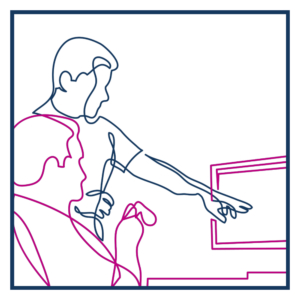In this article..
It’s Sunday night. Do you feel down about the thought of going back to work? Maybe you’re dreading it. Hopefully, it’s not as severe as that, but you are still running through everything you’ve got coming up this week. That’s the Sunday night blues. Talk to your friends and colleagues and you’ll find it’s a common feeling. But how big a problem is it? What impact does it have on productivity at work? And what can employers do to help their staff return to work rested and ready to start the week on the right foot?
These are questions that have long interested us here at Investors In People. Our We Invest in People accreditation is one of the key ways we help organisations improve their employee experience and so we’re always looking for ways to #MakeWorkBetter.
It’s why, last year, we got together with two other organisations who were also keen to get some hard data on how much of a problem this is for the UK workforce – the University of Exeter and Channel 4.
The preliminary research was published earlier this year. Exeter University’s Exeter Expertise podcast sets out the research and what organisations can do with what they’ve learned in detail.
In brief, its findings suggest that:
- A blurring of the boundaries between work and home, made more acute by the pandemic, has made the Sunday night blues worse because people feel less able to switch off. Factors contributing to this include feeling the need to check emails over the weekend, unfinished jobs left over from the week before, as well as self-imposed expectations of what they need to achieve.
- The impact of the Sunday night blues varies from individual to individual. Some will experience it as dread or anxiety. Others find it affects their sleep or increases their blood pressure. Many reported it negatively impacted their home life. According to Professor Ilke Inceoglu, Professor of Organisational Behaviour and HR Management at the University of Exeter Business School, the Sunday night blues “can impact your personal relationships with partners and families because you’re already working, so you’re actually not spending time with others on the Sunday. You may be physically but not mentally present with them.”
- It doesn’t just affect people who don’t like their jobs. This was the finding Channel 4’s People Director, Kirstin Furber, said surprised her the most. She told the audience at our Sunday Night Blues event (see below for a full video), sharing the research findings that it’s something she recognises all too well: “On a Sunday afternoon I start going, it’s nearly the end of the weekend and we’re relaxed – and now we’re thinking about Monday and what time do we need to get up and what is the week going to hold? There are some positive things as well as things that are maybe a bit challenging. So I would definitely say I have the Sunday night blues, even though I love my job.”

Kirsten Furber, Channel 4 (l), Professor Ilke Inceoglu, The University of Exeter (c), and Paul Devoy, Investors in People (r) recording the Exeter Expertise podcast.
What’s clear is the Sunday night blues is having an impact on people’s wellbeing because it makes them less able to recharge in their time off from work. The knock-on for businesses is the effect on employee engagement. As our CEO Paul Devoy says, “if a worker is arriving at work on a Monday morning and not presenting the best version of themselves they won’t be as engaged or productive as they otherwise might be.”
So, if you’re concerned the Sunday night blues might be having a negative impact either on you or your business, what practical steps can you take to improve things?
Changes individuals can make:
- Plan a nice activity for Sunday evening. If you enjoy exercise, for example, do that. Arrange to see friends or perhaps even take a leaf out of our CEO’s book and iron while watching sport on TV. As Paul told the audience at our Sunday Night Blues event, ironing is “quite a mindful practice and I find it takes my thoughts off work. Plus, I like to watch the football.” As you can see, the point here is to find a positive activity that works for you, one which you actively plan and which takes you away from thinking about the week ahead.
- If you must work, be disciplined about it. Some people in the study said that working on Sunday helped them feel prepared for the week ahead, but they also felt it increased the pressure on their homelife. It’s therefore not something we’d generally recommend, but if it’s something you feel you have to do, set aside a block of time – no more than a couple of hours – so it doesn’t affect the rest of your weekend.
- Try to plan something nice for a Monday. How much you can do this depends on the nature of your job, but can you arrange lunch with a colleague, for example, or put that project you’re excited to work on to the top of your To Do list?
Changes for HR and leadership teams to make:
- Ask your teams how they want to structure their working week. According to Kirsten, this is something she’s done with her team at Channel 4 as a result of the preliminary findings: “It’s important to ask your team about when’s the best time to have that team meeting. Is it nine o’clock on Monday morning? Maybe, for some people, it is. But, actually, I know my team say, ‘I don’t want to have a meeting with you at 9 o’clock on Monday morning. I need some time to work through, so I’m ready for the week.’ So, we now have our meetings in the afternoon.”
- Be mindful of the example you set as a manager. If you are seen to work at a weekend, it’s far more likely your team will feel they have to as well. So, when you’re about to send that email, think about this advice from Paul: “If you want to work on a Sunday night, you can simply set your emails to go on a Monday, unless they absolutely must be sent straightaway. There’s no real reason to bombard people with emails over the weekend. It just needs a bit of thought about the other person and some thought as a manager about the impact on the employee when they receive correspondence. If as managers we make some slight adjustments, we can make the world of difference to our employees.”
- Invest in wellbeing training for your managers. We have two million accidental managers in the UK – people who were put into management positions but not trained to do it. As Paul told our webinar audience, “if you’ve got a pound to invest in anything, invest it in your managers, because your managers are the people who look after your staff. If you can support them to be the best they can be, they can create the conditions which are going to make people happier to come into work.”
What’s next?
Now that we know the kind of impact the Sunday night blues is having on individuals, the next phase in our partnership with the University of Exeter and Channel 4 is to look at the impact it has on people’s behaviour at work.
We’ll then furnish organisations with detailed information about the effect on employee engagement and productivity and, later this year, we’ll be jointly producing a toolkit for organisations with guidance for employees, line managers and HR Directors.
Together, we hope to help banish the Sunday night blues and enable people to be happier and more engaged at work.







